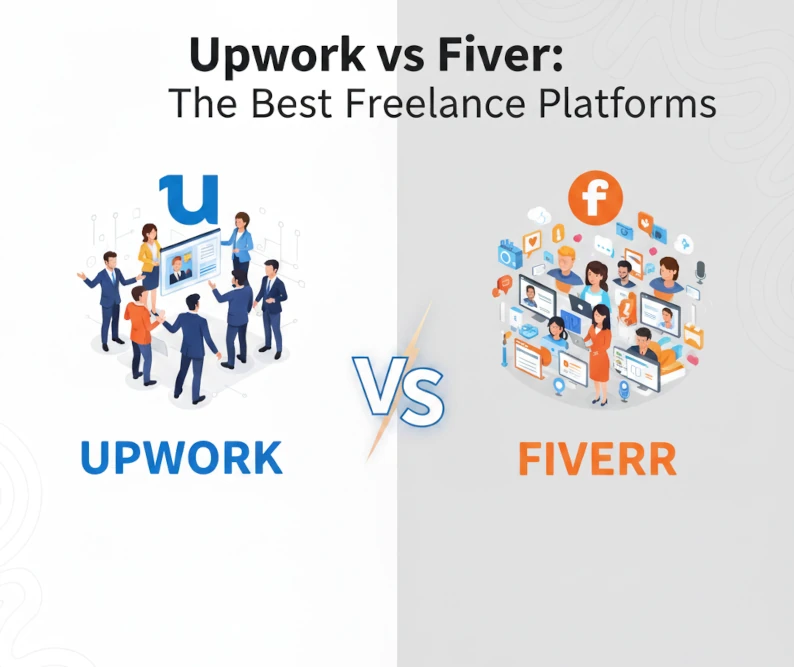Freelancing is flourishing worldwide, giving the community flexible careers, and platforms like Upwork and Fiverr are popular the way in connecting freelancers with clients. Both platforms offer surprising opportunities, but they work in very different ways; one focuses on professional durable projects, while the other makes active creative gigs more available.
The grown question is: which one should you choose? In this article, we’ll investigate how Upwork and Fiverr work, their dissimilarities, pros and cons, and which platform may be the best fit for your freelancing journey.
Why Freelancing Platforms Matter
Before diving into Upwork and Fiverr, it’s essential to learn why freelancing programs are so powerful today. These marketplaces connect customers and freelancers directly, erasing the need for middlemen. They offer freelancers’ approach to tasks from everywhere on the planet, while consumers can find specialist scholars without handling usual renting headaches.
But the way these platforms function can make a significant difference in your progress. Some podiums are structured for complete professional relationships, while others are better for active, one-time projects. That’s why comparing Upwork vs Fiverr is so crucial; they’re created on very different systems.

Understanding Upwork
Upwork is generally specified as the LinkedIn of freelancing platforms. It’s made for specialists who are serious about freelancing and are going to build long-term relationships with customers.
How It Works
- Clients post tasks, either temporary or long-term.
- Freelancers ask by sending a proposal that interprets their skills, knowledge, and reasons they’re the right fit.
- Clients therefore review proposals, check freelancer descriptions, and employ a first-rate match.
- This makes Upwork a proposal-driven platform, where freelancers need to pitch themselves for tasks.
Who It’s Best For
Upwork is an excellent fit for:
- Freelancers with powerful portfolios and work knowledge.
- People who want long-term contracts or continuous work.
- Clients expect professional connections rather than one-time gigs.
Understanding Fiverr
Fiverr takes a completely different approach. Instead of freelancers applying for jobs, freelancers create gigs (service packages) that customers can browse and buy directly.
How It Works
- Freelancers design service list (for instance: “I will design your trade logo in 24 hours”).
- Clients flip through these gigs, compare prices, and place orders straightforwardly.
- Communication starts after purchase, and the freelancer transfers the project.
This makes Fiverr a gig-driven platform, where clients come to you instead of you pitching to them.
Who It’s Best For
Fiverr is an excellent fit for:
- Beginners with short knowledge but good abilities.
- Freelancers present imaginative, one-time services like pictorial design, video editing, writing, or digital marketing.
- Clients who need small, quick, and affordable jobs done.
Major Differences between Upwork and Fiverr

1. Pricing System
- Upwork: Freelancers fix hourly or fixed project rates. Clients are frequently brought in for continuous work, and estimating depends on opportunity and skill.
- Fiverr: Services are pre-bundled into different price levels (elementary, standard, premium). Clients know straightforward what they’ll pay.
- Takeaway: Upwork offers elasticity in costing and bargaining, while Fiverr is simpler and understandable.
2. Competition & Visibility
- Upwork: High contest because freelancers must win jobs through bids. Getting seen depends on your portfolio, reviews, and how well you pitch.
- Fiverr: Freelancers rely on generating engaging gig listings. Your perceptibility depends on Fiverr’s algorithm and how advanced your gig is.
- Takeaway: Upwork rewards powerful bids, Fiverr rewards powerful gig marking.
3. Project Types
- Upwork: Best for general or complex projects, such as building websites, directing social media accounts, or continuous consulting.
- Fiverr: Best for temporary or one-time inventive tasks, like trademark design, voiceovers, or proofreading.
- Takeaway: Upwork is for continuous cooperation, Fiverr is for smart wins.
4. Client Relationships
- Upwork: Encourages repeat trade and ongoing contracts. Many freelancers find fixed customers here.
- Fiverr: Relationships are often short and project-based. It’s less about building long-term partnerships.
- Takeaway: If security is important, Upwork wins. If variety inspires you, Fiverr is better.
5. Ease beneficial
- Upwork: The application process takes effort, writing bids, awaiting replies, and facing with possible choice.
- Fiverr: Much plainer to start. Just generate your gig, and you can start taking orders without bidding.
- Takeaway: Fiverr is beginner-intimate, Upwork suits skillful experts.
6. Earning Potential
- Upwork: Higher rates possible, particularly for professional experts. Top freelancers can gain thousands per month.
- Fiverr: Lower average pay initially, but high-volume sellers can scale income. Many sellers build six-figure incomes with a gig bundle.
- Takeaway: Upwork offers higher average pay per project; Fiverr offers extreme scalability if you invite constant purchasers.
Pros and Cons of Each Platform
Upwork Pros
- Access to crucial customers and unending projects.
- Flexible costing (hourly or fixed).
- Higher potential gain per project.
- A professional environment that builds trustworthiness.
Upwork Cons
- In tough competition, new freelancers struggle initially.
- Requires time and effort to apply for jobs.
- Takes a percentage commission from your earnings.
Fiverr Pros
- Easy at the beginning, no service process.
- Great for learners building their first portfolio.
- Transparent costing for both customers and freelancers.
- A wide range of classifications for creative services.
Fiverr Cons
- Lower pay at first.
- Harder to build long-term relationships.
- Reliant on Fiverr’s algorithm for visibility.
Which One Should You Choose?
The choice between Upwork vs Fiverr depends on your aims:
- If you’re a knowledgeable freelancer looking to build crucial professional connections and work on bigger projects, Upwork is the better choice.
- If you’re a learner or someone offering shorter artistic services, Fiverr will present you with aster freedom and faster results.
Many freelancers indeed use both platforms, Fiverr to invite fast gigs and Upwork to build a long-term establishment.
Conclusion
Upwork and Fiverr are not competitors. They offer different services for freelancers and customers. One is created for mature professional freelancing material (Upwork), and the other is geared toward more creative, fast and quickly available freelancing material (Fiverr).
The real question is: what kind of journalist are you going to be? If you’re trying for fixed profit and continuous work, choose Upwork. If you want type, flexibility, and fast wins, choose Fiverr. And if you’re energetic enough, use both together to increase your freelancing achievement.
Ultimately, they both opened the doors for thousands of freelancers to engage with clients to make money worldwide. In choosing one or the other, it’s not a matter of which is better, but rather which is better for you.
FAQs
Who pays more, Upwork or Fiverr?
Upwork usually pays more due to lower fees and bigger projects.
Can I get long-term clients on Fiverr?
Yes, but it’s less common compared to Upwork.
Is Upwork free to join?
Yes, but there are paid membership options for more connects.
Do clients trust Fiverr?
Yes, many clients use Fiverr for quick, reliable services.


